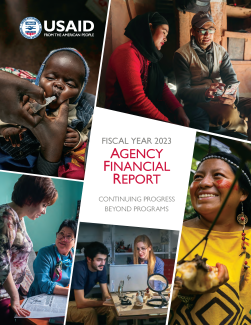In 1961, when President John F. Kennedy addressed Congress to announce the creation of the U.S. Agency for International Development (USAID), he said: “[W]e have not only obligations to fulfill, we have great opportunities to realize.” This was true in 1961, and it is true today in 2023. For more than six decades, USAID has proven that when we partner with communities around the world, we can end cycles of recurring famine and poverty, eradicate deadly diseases, revitalize some of the world’s most valuable ecosystems, and advance peace and stability across the planet.
But today, growing challenges threaten to slow, and in some cases even reverse, the progress we have made. As the climate changes, natural disasters are increasing in frequency and intensity, leading to a sharp rise in humanitarian needs. A greater proportion of the world’s population face conflict than at any time since World War II.
Debt distress threatens at least 70 countries around the world. Health systems are under increasing strain in the wake of the pandemic, leading to a resurgence in diseases from measles to tuberculosis. The stark reality is that as these challenges grow, our assistance budgets simply are not rising fast enough to keep up.
To meet the moment and continue to drive progress on the scale and at the pace we need, we will have to bring other donor countries, the private sector, multilateral institutions, foundations, and local organizations in our partner countries along with us. So USAID has set a new reform agenda aimed at delivering this progress, beyond our programs: using our expertise, convening power, and advocacy to draw in others, leverage more resources, spark innovation, and inspire broader movements for change.
To do this, we need a development agency designed for this way of working, so we have set out an ambitious internal reform agenda and launched an Internal Reforms Results Hub to track and communicate our progress. Already, as of September 2023, we have cut nearly four million hours of red tape and unnecessary work so our staff can be as nimble and efficient as possible. We have launched a new Enterprises for Development, Growth, and Empowerment (EDGE) Fund to help unleash the potential of the private sector to take on development challenges; the fund has already leveraged more than $100 million in new private-sector investment. And we have doubled the hiring of new career staff over the past three years, so we can build a workforce equipped to meet these growing challenges.
It is, after all, our staff around the world who will drive the progress we need. Our teams are forging new partnerships, coming up with new solutions to new challenges, and achieving extraordinary results in our headquarters here in Washington, D.C., and at our 81 Missions around the world. It is because of these dedicated public servants, and their innumerable sacrifices, that we are able to affect meaningful change.
In this Agency Financial Report, we have worked closely with the Office of Inspector General to provide complete, reliable, and accurate financial and summary performance data. The Independent Auditor’s Report, including reports on internal control and compliance with laws and regulations, appears in the Financial Section of this report. The section on Management’s Discussion and Analysis reviews our assessments of our internal controls, risks, and other issues.
Just as President Kennedy saw the opportunity created by his own era of rapid globalization, population growth, and technological change, we must now realize the potential of today’s moment: to transform the way the world does development and bring about a new era of gains in global health, peace, and prosperity.
Samantha Power
Administrator
November 14, 2023

